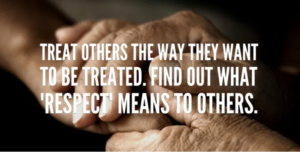At a time when you may be thinking about ‘5 Gold Rings’ and Christmas I would like you to reflect on what is sometimes referred to as The Golden Rule. This maxim, in one form or another, appears in most cultures and religions.
Treat others the way you want to be treated.
The golden rule can be formulated in three main ways:
Positive/directive form. The positive formulation of the golden rule states that you should treat others the same way you would want to be treated yourself.
E.g. If you want people to be polite to you, then you should be polite to them.
Negative/prohibitive form. The negative formulation of the golden rule states that you should not treat others in ways you would not want to be treated yourself.
E.g. If you don’t want people to be rude to you, then you shouldn’t be rude to them.
Empathic/responsive form. The empathic formulation of the golden rule states that when you wish something upon others, you also wish it upon yourself.
E.g. If you wish positive things to someone else, then you also wish positive things to yourself.
A criticism of the golden rule, and particularly when it comes to its implementation in practice, is the fact that the golden rule suggests that others would like to be treated the same way you would like to be treated, which is not necessarily true.
A variant, which is sometimes called The Platinum Rule, states that you should treat others the way they themselves would like to be treated. Simply put, the platinum rule means that instead of assuming that other people want to be treated the same way you do, you should aim to discover how people actually want to be treated, and then treat them that way.
One way to accomplish this is to wait before taking action which involves someone else and ask yourself “is this how this person would like to be treated?”. If the answer to that question is “yes”, then proceed. Otherwise, modify your plan of action accordingly, before moving forward.
When reflecting on how you should act and treat others you will probably find yourself thinking about certain values or virtues.
What virtues would you choose as important to you? Examples could include … justness, loyalty, good sportsmanship, fairness, honesty, kindness, consideration, compassion, self-control, tolerance, forgiveness, benevolence, respect, politeness, dignity, admiration, friendliness, love, integrity …
By considering, and applying, virtues such as these you can influence the conduct of others around you. You could pick one virtue and really focus on it for a day. You could have a New Year resolution to identify, consider and apply a new virtue each day. You should never underestimate the effect of your actions, no matter how small, on others.
The pebble, dropped in a pool, can make ripples to the furthest shore.
“If we are to live together in peace, we must come to know each other better.” – Lyndon Johnson


